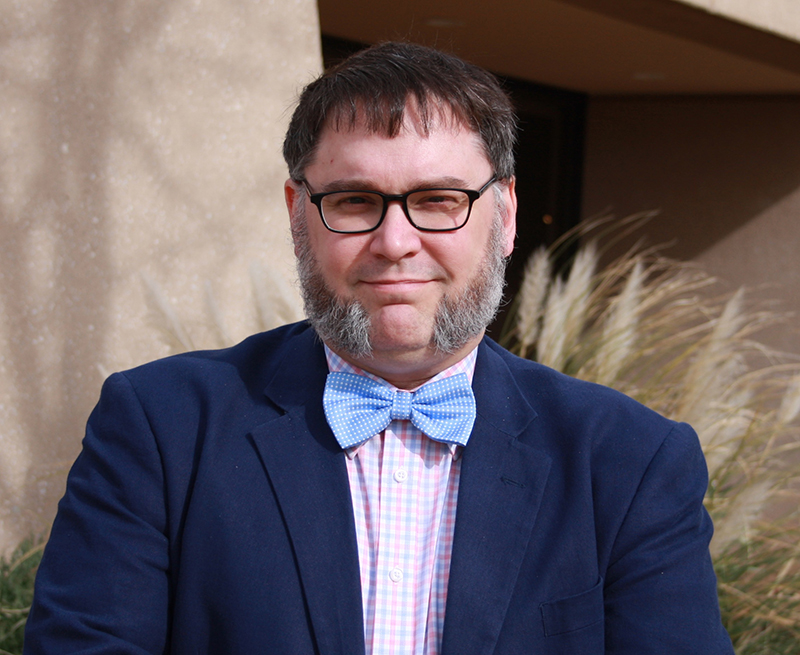 Midland College (MC) Professor Dr. David Hopkins, Jr. has a lot in common with his
students.
“When I was younger, I was encouraged to go to the local community college in Michigan
where I grew up,” Hopkins said. “I took a few classes, and everything changed after
I took some history classes.”
At the time, Dr. Hopkins was not sure exactly what he wanted to do with history; however,
he knew he wanted to pursue it.
“Learning different stories of people and how they shaped the past really got me thinking,”
Hopkins said. “Those classes at the community college really inspired me. After that
experience, I transferred to Michigan State University, then got my master’s and doctorate
degrees at Wayne State University, and here I am all these years later.”
Being a first-generation college student creates a unique bond between Hopkins and
his MC students.
“I have a lot of those moments where students come to my office asking me about transferring
to a four-year university,” Hopkins said. “I have many students come by and tell me
they know what they want to do in life, like they have decided they want to be a college
professor so they want to learn about my grad school experience. I am happy to be
writing letters of recommendation for my students. I love seeing a change happen over
the course of the semester. At first I can tell some students are thinking, ‘I am
not sure about the school thing,’ then by the end I can see they are thinking, ‘I
like college, and I want to take it as far as I can.’”
However, there are difficult parts of being a history professor.
“The hardest thing I have to do is to get students to read the textbook,” Hopkins
said. “Students have to be exposed to the material in different ways. The textbook
is not going to talk about everything I include in class lectures, and I am not going
to talk about everything that is in the book. So, I have weekly, online quizzes with
basic questions about the reading. I have noticed improvements on students’ exams.”
Dr. Hopkins says students who attend class and pay attention usually do well in his
courses. In return, he tries to make his lectures dynamic.
“A lot of students come to my class with preconceived notions about history being
boring,” Hopkins said. “I take those opinions as a challenge. I think of my lectures
as a performance. Luckily, I played in a band for a long time. I learned that shows
rarely go on without hiccups, so I do not make rigid lessons plans. I know all the
material. I show up and just try to make it fun, educational and interesting. I tell
stories, or draw parallels to modern times or even sports. I mix in audio, YouTube
clips, a documentary or even an episode of a TV show to break up the monotony. Students
do not want to hear me talk all the time, nor do I want to talk all the time. I also
tell a lot of jokes because we put historical figures on pedestals; we forget they
are human. They failed; they had successes; they had a sense of humor. I think my
corny history jokes also help get students’ attentions.”
Recently Dr. Hopkins was awarded an MC Teaching Excellence Award.
“I was happy just to be nominated,” Dr. Hopkins said. “I know how important of an
award this is; I have seen so many of my deserving colleagues be both nominated and
win. When I heard I was nominated, I was excited, grateful and humbled. Then during
the awards ceremony, it was surreal. I was in disbelief. It took a second for it to
click that I had won. I just tried to enjoy the moment.”
When he is not teaching the required collegiate U.S. History courses, Dr. Hopkins
also teaches in the MC College Classics program—specialized courses for people 50+
years of age.
In addition, Hopkins coordinates the West Texas Symposium of History and the West
Texas Journal of History, an annual event and publication endowed by Paula and Jim
Henry where community college faculty, graduates and students present and write articles
focusing on a wide array of topics—not just West Texas history. This year’s event
is on Saturday, April 13.”
The West Texas Symposium of History and accompanying journal require a lot of hard
work, but Dr. Hopkins says it does not feel like work, making him a true example of
the adage “choose a job you love, and you will never have to work a day in your life.”
For more information about the April 13 West Texas Symposium of History, visit www.midland.edu/westtexas
“History and teaching are my callings,” Hopkins said. “I cannot see myself doing anything
else. Having the support of my family goes a long way in making teaching so much fun.
I am so lucky to have found MC. During my hiring interview I felt like I had a lot
in common with my interviewers; I had a connection with them. The faculty and staff
at MC are super nice and friendly. They went out of their way to help me as a new
employee and make me feel at home. I just try to copy them and make my students feel
the same way in my classes.”
|
